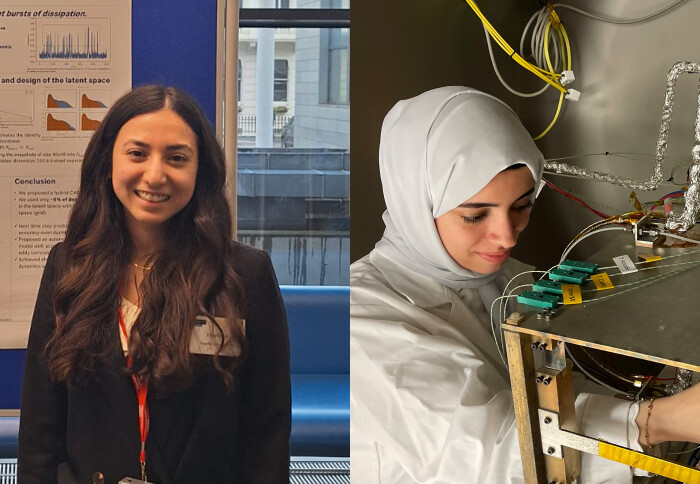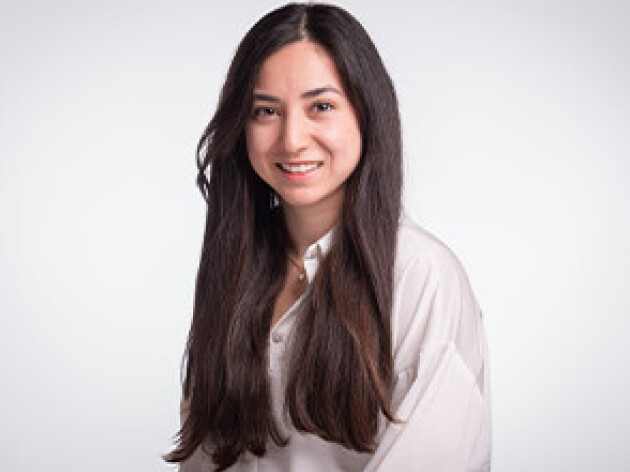Imperial students awarded prestigious Amelia Earhart Fellowships
by Ayesha Khan

PhD students, Elise Özalp and Hamda Al-Ali have been named as the UK’s only recipients of the Amelia Earhart Fellowship 2024.
Two PhD students from the Department of Aeronautics have become Amelia Earhart Fellows following successful selection in the latest application round. Their win marks a significant achievement in the field of aerospace as the only awardees from the United Kingdom.
The Zonta International Amelia Earhart Fellowship, established in 1938 in honour of the famed pilot Amelia Earhart, recognises up to 30 women annually pursuing doctoral degrees in aerospace or space sciences. Each fellow receives $10,000 to support their research and academic endeavours.
Elise Özalp: Advancing Fluid Dynamics

Elise’s research, conducted as part of the EU-funded PhyCo project, focuses on using machine learning to solve engineering problems that are based on complex physics. While machine learning is commonly used in many fields, it often overlooks the physical laws that govern certain systems. Taking this into consideration, Elise’s research seeks to create neural networks that include these physical constraints, producing models that better reflect real-world behaviour.
Specifically, Elise is working on chaotic systems, like turbulent flows, which are very hard to predict. To overcome this, her research uses a type of machine learning called recurrent neural networks, which can find patterns over time – with aim to build more accurate and efficient models that integrate laws of physics.
This work is important for research fields such as fluid dynamics and weather forecasting, where predicting complex behaviour is key.
On receiving the Fellowship, Elise said: “It is a great honour to be awarded the Amelia Earhart Fellowship, become part of the Zonta Club, and to connect with successful women in aerospace.
“The financial support will enable me to attend conferences and workshops, especially those overseas, which are typically prohibitively expensive.”
Hamda Al-Ali: Plasma Propulsion Technology
 Hamda is pioneering research in plasma propulsion systems for space exploration. Her work focuses on the design and testing of the Spherical Tokamak Thruster – a novel plasma propulsion system for use in outer space.
Hamda is pioneering research in plasma propulsion systems for space exploration. Her work focuses on the design and testing of the Spherical Tokamak Thruster – a novel plasma propulsion system for use in outer space.
The thruster combines principles from nuclear fusion devices called Tokamaks and electric propulsion to create a more powerful and efficient engine, for both interplanetary and interstellar exploration.
The Spherical Tokamak Thruster is unique because it doesn’t use traditional electrodes, making it more durable with the opportunity to use a wide range of fuels, from gases like xenon to substances like water. It also has a very high specific impulse, meaning it consumes less fuel for given amount of thrust produced, and thus much more efficient than existing propulsion systems.
Efficiency is key for deep space missions, as it reduces fuel mass and costs, allows for longer missions and offers greater flexibility.
Expressing her gratitude for the fellowship, Hamda said: “Receiving this Fellowship is an honour - a prestigious award that recognises the remarkable potential and dedication of women in aerospace.
"The funds will be crucial for acquiring essential hardware for my research and attending international conferences, which will allow me to showcase my work and foster collaborations.”
Inspiring the next generation
Both Hamda and Elise chose pathways in aerospace engineering for its cutting-edge potential and the opportunity to contribute to space exploration and groundbreaking technologies.
Hamda’s passion for the field began from childhood: “From a young age, I was captivated by the mysteries of space and the desire to contribute to humanity's exploration beyond Earth. I was drawn to aerospace engineering by its potential to solve complex problems and uncover significant insights about our universe.”
With women only making up 25% of the aerospace workforce globally, the unique opportunities and challenges presented has allowed Elise and Hamda to build strong support networks and forge connections that inspire them to continue pushing the boundaries of innovation.
Elise emphasises the importance of female representation in aerospace: “Being a woman in aerospace is both challenging and rewarding. It is incredibly important to have female representation in this field, as it provides role models for the next generation.
"I have found the support network for women in aerospace to be exceptionally strong. It is inspiring when other women in engineering come and give presentations, sharing their journeys and achievements.
"Specifically, previous Amelia Earhart fellows in the Department of Aeronautics encouraged me to apply. Their encouragement has been invaluable to my journey, and I hope to inspire and support future women in aerospace as well.”
Since its inception, the Amelia Earhart Fellowship has supported 1,335 women from 79 countries, many of whom have become leaders in their fields, including astronauts, aerospace engineers and senior officials across government and industry.
Read more about the application process and previous Fellows.
Article text (excluding photos or graphics) © Imperial College London.
Photos and graphics subject to third party copyright used with permission or © Imperial College London.
Reporter
Ayesha Khan
Department of Aeronautics